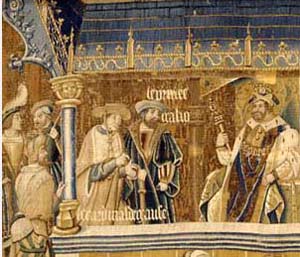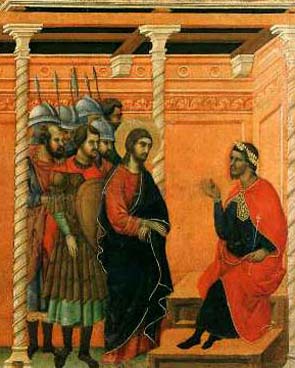 |
Organic Society
Monarchy, Aristocracy & Democracy - III
Does Authority Represent
God or the Sovereign People?
Plinio Corrêa de Oliveira
Let us consider an authority, be it a king, a noble or a president of a republic. He issues a law and commands his subjects to obey it. Why should they obey? Is it for fear of receiving a fine or going to jail? No doubt, these are reasons of prudence to obey, but it does not explain everything.
At base, the man who has authority is made of flesh and bone as we are; therefore, since he is equal to us in that respect, why should we obey him?

A King in court - Natural Law requires the obedience of his subjects |
Two principal reasons for our obedience are usually offered: One is Catholic and the other is revolutionary and neo-pagan.
The Catholic reason
The Catholic reason is based on the fact that God created men with the instinct of sociability. There are some animals that isolate themselves and do not tend to live in groups; others are gregarious, they form groups. Men are not gregarious but social; they tend to live in society.
There are some exceptions, such as the hermits who live isolated lives, but the normal for man is to live together. God could have created man without that instinct, but He did not. Therefore, men are called to live in society.
God also created men so that each one has a limited understanding of things and they do not agree about everything. Disagreement is a factor that leads to division and disorder. Thus, if society is to be ordered for the common good, there must be someone to command. Without a person to command, there is no order or harmony; in final analysis, there is no society. Since man was made to live in society, a government of some sort is absolutely necessary. God willed that men have a government and someone to exercise authority when He created them as sociable beings.
For this reason, when a man subjects himself to the laws of a government, he fulfills the plan of God. The government is exercised in the name of God, and to obey it is to obey God.
Someone could object: But if a government commands something that is against the Law of God, are we obliged to obey?
No, we should not obey. The government was instituted by God first and foremost to carry out His Holy Law. If the appointed authority does not obey God, it revolts against God; then, it should not be obeyed in that point.

Christ confirms Pilate's authority |
Another objection: Are you telling us that we should obey a Protestant such as Queen Elizabeth or a Communist such as Brezhnev if we were under their authority?
What I am telling you is that God does not choose the persons who exercise the authority. He wants a government to exist, and it falls to men in the course of History to choose their forms of government as well as the persons who will hold the power. Once chosen, however, the authority that follows Natural Law represents God.
Not only the authority of the leader, but also any authority, represents God. All authorities that follow Natural Law represent God: the father for his children, the husband for his wife, the employer for the employee, the teacher for the pupil. Every legitimate authority comes from God, represents God and governs in the name of God.
These authorities can abuse their authority or be chosen poorly, but they represent God.
The Emperors of the Roman Empire were pagan and idolaters; notwithstanding, when Pontius Pilate reprimanded Our Lord for not answering the Roman authority, Christ said to him: “You would not have any power over me, unless it were given to you from above” (Jn 19:11). This phrase has many other meanings, but it also signifies that Our Lord recognized the authority of the Roman consuls and of his Emperor as being in accord with Natural Law and, as such, as representing God.
This is Catholic doctrine with regard to Natural Law.
The revolutionary reason
Contrary to this doctrine is the theory invented in the 18th century by the Encyclopedists, whose best known exponent is Jean Jacques Rousseau. This is the doctrine of the sovereignty of the people. Explaining why men should obey the government, Rousseau affirms that all men are equal by nature; consequently, the existence of kings, princes and nobles is a fraud. Men must command themselves since no one man is superior to another.
To justify his theory, he claims that in very remote times men did not live in groups and did not have the social instinct. Rather, each man lived isolated. At a given moment they gathered and resolved to form a society; to do so, they understood that they needed to have a government. Thus, they established the first government, which duly expressed the will of all those who constituted the social group. Hence, the government ruled in the name of those who formed that society.
Afterwards, the sons, grandsons and great-grandsons of those people were obligated to abide by the social contract made by their ancestors. Today we obey the government because of that agreement which bound all of us.
It is the people, according to this argument, who rule by means of governments elected in their name. In final analysis, each of us who obeys the government is obeying his own will.
In simple words, this is the essence of the revolutionary theory of the sovereignty of the people conceived of by Rousseau.
Continued

Posted November 15, 2010

  | | Prof. Plinio |
Organic Society was a theme dear to the late Prof. Plinio Corrêa de Oliveira. He addressed this topic on countless occasions during his life - at times in lectures for the formation of his disciples, at times in meetings with friends who gathered to study the social aspects and history of Christendom, at times just in passing.
Atila S. Guimarães selected excerpts of these lectures and conversations from the transcripts of tapes and his own personal notes. He translated and adapted them into articles for the TIA website. In these texts fidelity to the original ideas and words is kept as much as possible.

Related Topics of Interest
 Part I: Definitions, Examples, Nuances Part I: Definitions, Examples, Nuances
 Part II: Theoretical and Practical Positions of the Church Part II: Theoretical and Practical Positions of the Church
 Leadership Is Not Established by a Social Contract Leadership Is Not Established by a Social Contract
 Belloc: 'As a Catholic, I Am Strongly Attached to Rousseau’ Belloc: 'As a Catholic, I Am Strongly Attached to Rousseau’
 Socialism and Distributism in Catholic Clothing Socialism and Distributism in Catholic Clothing
 Feudalism and the Modern State Feudalism and the Modern State
 The State of Mind that Generated the Revolution The State of Mind that Generated the Revolution
 Liberals, Moderns and Progressivists Liberals, Moderns and Progressivists
 Revolution and Counter-Revolution in the Tendencies, Ideas & Facts Revolution and Counter-Revolution in the Tendencies, Ideas & Facts
 Revolution and Counter-Revolution – Overview Revolution and Counter-Revolution – Overview

Related Works of Interest
|
|
Organic Society | Social-Political | Home | Books | CDs | Search | Contact Us | Donate

© 2002-
Tradition in Action, Inc. All Rights Reserved
|
 |
|